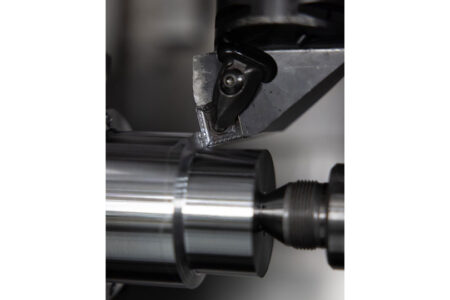With the HU3, HU5 and HU7 geometries, Walter is completing its range of turning indexable inserts for heavy-duty roughing operations. The “H” in the designation of the negative, single-sided and therefore highly stable inserts stands for “Heavy (Roughing)”, while the “U” refers to their universal use. Each of the three geometries has specific features, however, and is, therefore, suitable for different applications. The HU7 geometry for steel and cast iron workpieces is the most stable turning indexable insert in Walter’s product range. Its straight cutting edge and the negative protective chamfer mean that it can be used for the highest feeds and very large depths of cut of up to 17 mm. Its excellent stability makes large machining volumes possible, even in difficult conditions, for example with forged parts or interrupted cuts.
Compared to the HU7, the HU5 geometry with curved cutting edge and open chip breaker groove design has a slightly softer cutting action. The cutting pressure and cutting forces are reduced. The HU5 is therefore the first choice wherever heat generation and/or vibration occur, for example when roughing high-temperature alloys and stainless steel. The HU3 geometry with V-shaped chip formation optimises chip breaking even with small depths of cut and fluctuating material removal, for example with forged skin. It can be used primarily in steel for depths of cut from 0.8 mm. All three turning insert types are coated with the new Tiger·tec® Gold grades WPP10G, WPP20G and WPP30G, which further increase the wear resistance due to the highly textured, multi-layered MT-TiCN structure. Users in the oil and gas and aerospace industries, as well as manufacturers of turbines and generators, can therefore benefit from the high level of productivity, as well as process reliability.
This content was originally published on the Walter Tools website.
